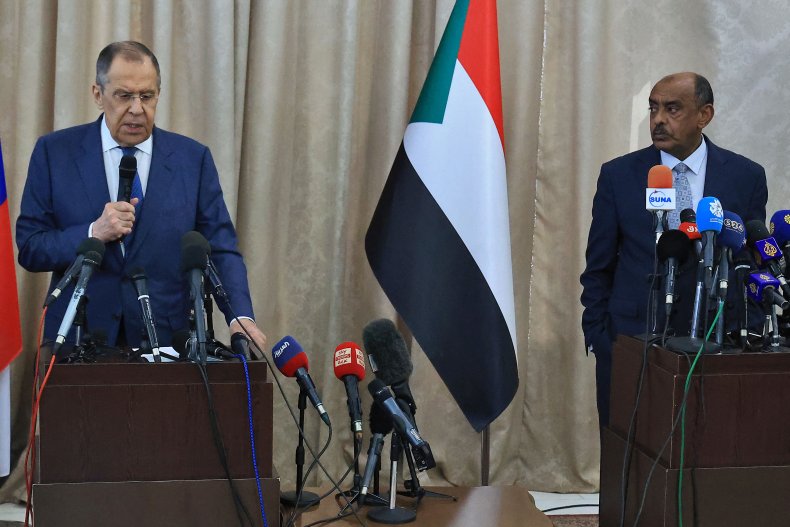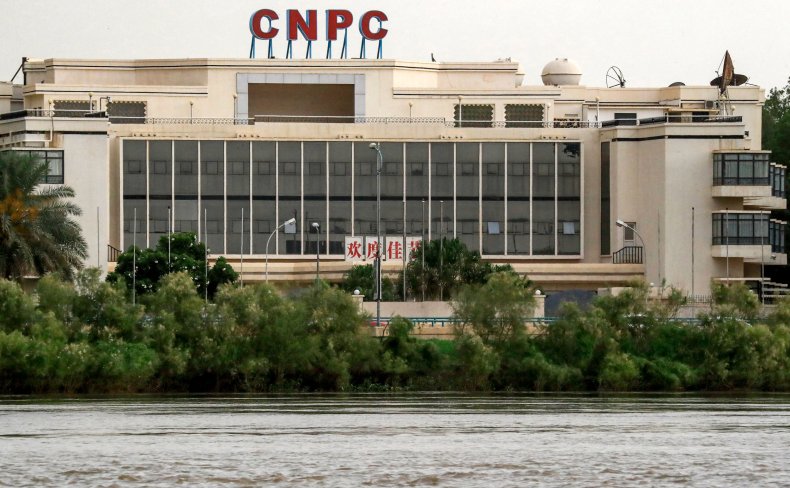TOM O'CONNOR
As a fragile U.S.-brokered ceasefire between rival generals unravels amid fresh reports of violence erupting throughout Sudan, fears of an all-out civil war with broad consequences for neighboring African nations and global stability are spreading throughout the international community, including its top three powers.
But while the United States, Russia and China have different stakes in Sudan, none of them has a vested interest in state collapse, and each is mobilizing its own response to the volatile situation unfolding in this strategic yet restive part of Africa.
Jacqueline Burns, a RAND Corporation senior analyst who worked firsthand on peace efforts in Sudan during her tenure as strategy advisor for the U.S. State Department, told Newsweek that influential nations on the sidelines of the conflict "could play a very helpful role in convincing the two armed factions to stop fighting."
"But if they continue to support processes that prioritize the demands and control of the armed groups over civilian actors," she added, "it could be detrimental to long-term peace and stability."
Such an approach, she argued, is where Washington went wrong in its previous attempts to bring peace to Sudan and usher in a new era of democracy.
After gaining its independence from Egypt and the United Kingdom in the 1950s, Sudan underwent a series of coups, inter-ethnic conflicts and two devastating civil wars before dividing in two in 2011, establishing the world's youngest recognized nation, South Sudan, which is also beset by unrest. Sudan would remain under the rule of longtime President Omar al-Bashir until his ousting amid widespread protests in 2019.
With Bashir out, the Sudanese Armed Forces moved in, establishing a temporary military government led by General Abdel Fattah al-Burhan and his deputy, General Mohammed Hamdan Dagalo, widely known as Hemedti. Dagalo is the leader of the Rapid Support Forces (RSF), a paramilitary group comprised largely of the Arab Janjaweed militias that fought on behalf of the government against a rebellion by non-Arab groups in the western Darfur region.
The U.S.-Sudan relationship has been long marred by sanctions in response to alleged human rights abuses committed by Sudanese forces throughout the country's conflicts and ties to militant groups such as Al-Qaeda. It improved, however, after Bashir's removal from power and the signing of a historic military-civilian power-sharing agreement.
In 2020, the same year a peace deal was signed in the long-running Darfur conflict, then-U.S. President Donald Trump lifted Sudan's designation as a state sponsor of terrorism in exchange for compensation for the families of victims of terrorism and Sudan establishing diplomatic ties with U.S. ally Israel.
But relations once again soured in 2021 as Burhan and Dagalo teamed up to seize power from Prime Minister Abdalla Hamdok. Hamdok was soon reinstated but resigned in early 2022. As efforts resumed to reinstate civilian leadership, talks between Burhan and Dagalo broke down this month over the length of time allowed for the transition as well as the autonomy of the powerful RSF within the Sudanese Armed Forces.
With conflict returning to Sudan, Burns said the ongoing crisis "indicates the consequences of prioritizing the demands of armed actors and short-term concessions over longer-term, inclusive strategies that—while difficult and complex—have a better chance at breaking the cycle of militarized violence in Sudan and moving towards a future in which armed actors are made accountable to civilians."
"Looking forward, I think the U.S. and international partners engaging in Sudan need to move away from the one-size-fits-all approach to peace processes," she said, "in which we expect armed actors to sit down, make concessions, and sign formal agreements with often minimal participation from a diverse set of civilian stakeholders."
Burns also pointed to the role of other foreign interests at play in Sudan. In the immediate region, Egypt has fostered close ties to the Sudanese Armed Forces, while the United Arab Emirates and Libyan National Army leader Field Marshal Khalifa Haftar maintain connections with the RSF.
The situation is even more complex for Russia and China, two world powers increasingly active across Africa, as they seek to promote their economic and geopolitical interests while battles rage in the streets of Khartoum and other parts of Sudan.
 Russian Foreign Minister Sergei Lavrov (left) and Sudanese acting Foreign Minister Ali al-Sadiq (right) give a joint press conference at the airport in Khartoum on February 9, during Lavrov's official visit to Sudan. He said at the time that the two nations have "many tasks in the sphere of trade and economic, investment and humanitarian cooperation" and that "a number of Russian companies are working in Sudan, primarily in the field of development of the mineral resource base."ASHRAF SHAZLY/AFP/GETTY IMAGES
Russian Foreign Minister Sergei Lavrov (left) and Sudanese acting Foreign Minister Ali al-Sadiq (right) give a joint press conference at the airport in Khartoum on February 9, during Lavrov's official visit to Sudan. He said at the time that the two nations have "many tasks in the sphere of trade and economic, investment and humanitarian cooperation" and that "a number of Russian companies are working in Sudan, primarily in the field of development of the mineral resource base."ASHRAF SHAZLY/AFP/GETTY IMAGESMoscow, in particular, has increased its presence in Sudan in recent years. Bashir was an outspoken supporter of Russia, from which Sudan imports the vast majority of its arms. More recently, Russian Foreign Minister Sergey Lavrov met with both Burhan and Dagalo in the final stop of his Africa tour in February to shore up relations with the new military-led government.
Security assistance formed the core of these talks, including finalizing plans for a Russian naval logistics base on Sudan's Red Sea coast, as well as discussions regarding the extraction of lucrative resources from Sudan, including gold, via Russian-owned mining companies. Security surrounding these mining operations has been provided by Russia's Wagner private military group, which has partnered with the RSF in doing so.
Sergey Kostelyanyets, head of the Center of Sociological and Political Studies at the Russian Academy of Sciences' Institute for African Studies, told Newsweek that "Russia, just as most other major powers, should not be regarded as a single entity when analyzing international linkages."
Even with varied interests present in Sudan, however, he felt Russia would be hard-pressed to benefit from the current unrest.
"Any military-political destabilization, and the current one in Sudan is no exception, is a threat to such sensitive policy issues as agreements on the establishment of foreign military bases," Kostelyanyets said.
In fact, he argued that "Russia is likely to become the biggest external loser of the ongoing conflict in Sudan, as the West can and will exploit this window of opportunity to weaken the hand of Moscow."
But it's not foreign naval installations or gold mining abroad that Moscow is most concerned about when it comes to the fighting in Sudan. Rather, Kostelyanyets argued that Moscow's "key geopolitical interest in Sudan" is maintaining a corridor, especially by air, to Central Africa.
"The closure of Sudan air space has already adversely affected Russian capabilities in the Central African Republic, where Moscow has deployed several hundred military and civilian advisors and private contractors," he said. "If the West manages to compel Khartoum to hinder Russian communications with Bangui, that could be a major blow for Moscow's Central Africa policy, as alternative routes are much more expensive."
U.S.-led efforts to isolate Russia on the world stage over its war in Ukraine have had mixed results in Africa, where some countries have readily condemned Moscow and others have only further embraced Russian cooperation at a time when groups such as the Islamic State militant group (ISIS) continue to spread across the continent.
In Sudan, Kostelyanyets explained that "Moscow has a balanced relationship with both the army and the RSF." But he said that "Moscow's leverage falls short" of that of the West, which he said wields "debt-trap diplomacy, sanctions, and the carrot of investment," and of the Arab nations, especially Saudi Arabia and the UAE, who bring to the table "cash, a lot of it." Nor, he argued, "can Moscow project military force in the region as Egypt does."
"If one adds into the equation the fact any Russia-brokered peace agreement will cause an allergic reaction in Washington, London, and Brussels," he added, "the chances that the parties accept Russian mediation are very slim, though it could have been impartial and productive."
 A building of China's National Petroleum Corporation (CNPC) is seen near the Nile River waterfront in Sudan's capital Khartoum on September 15, 2022. In December, Chinese President Xi Jinping "stressed that China will continue to provide assistance within its capacity for Sudan’s development, carry out cooperation in oil, agriculture, mining and other fields, and encourage competent Chinese enterprises to participate in construction projects in Sudan, so as to help Sudan’s economic and social development."
A building of China's National Petroleum Corporation (CNPC) is seen near the Nile River waterfront in Sudan's capital Khartoum on September 15, 2022. In December, Chinese President Xi Jinping "stressed that China will continue to provide assistance within its capacity for Sudan’s development, carry out cooperation in oil, agriculture, mining and other fields, and encourage competent Chinese enterprises to participate in construction projects in Sudan, so as to help Sudan’s economic and social development."China's economic interests are even more extensive across Africa, a continent where every country, with the exception of the tiny kingdom of Eswatini, is a signatory to the global network of infrastructure projects known as the Belt and Road Initiative (BRI). As was the case with Libya's collapse in the wake of the NATO-backed rebellion that ousted leader Muammar el-Qaddafi in 2011, the ripple effects of a worst-case scenario in Sudan could mean instability in other African states where Beijing does business.
China has a particularly historic relationship with Sudan. As the first sub-Saharan nation to recognize the People's Republic less than a decade after it was established in 1949, Sudan has fostered close ties with China, and Beijing played an especially important role in developing the country's oil sector in the 1990s via the China National Petroleum Corporation (CNPC).
Like Russia, China has pursued a stated non-interference policy when it comes to Sudan, ignoring Western sanctions and selling weapons in the interest of promoting good relations. The relationship continued even after South Sudan took with it a large portion of Sudan's oil reserves in seceding in 2011. Chinese President Xi Jinping pledged to continue supporting Sudan's development during his meeting with Burhan on the sidelines of the first-ever China-Arab States Summit last December in Saudi Arabia.
That summit also paved the way for an emboldened Chinese strategy in the Arab world and Middle East, with Xi later meeting with Iranian President Ebrahim Raisi in February and brokering a historic reestablishment of ties between rivals Riyadh and Tehran last month.
Kai Xue, a Beijing-based lawyer who advises on financing and mergers and acquisitions in Africa, told Newsweek that China was also "on the side of stability and continuity in Sudan."
"China was able to demonstrate diplomacy in the Middle East due in part to the significant volume of commercial dealings which garners convening power with both parties," Xue said.
He pointed out that by the time of the China-Arab States Summit China had increased its daily purchase of oil from Iran to 1.2 million barrels per day, "making China Iran's economic lifeline." And, "in Sudan," he argued, "there is a parallel," as the "CNPC has a crucial role in increasing oil revenue for Sudan through its investment in South Sudan."
"This basis of mutual respect and need," Xue said, "will enable China to serve as a mediator that both sides are willing to listen to."
No comments:
Post a Comment